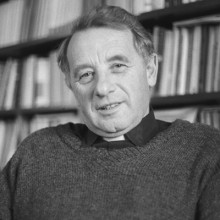Polish literature

Józef Tischner
(1931-2000) - he was a philosopher, Professor at the Papal Theological Academy in Cracow, and President of the Institute for Human Sciences in Vienna.
He was the most popular Catholic thinker and essayist in the Poland of the 1990s. His most recent books have been bestsellers, while the author himself was seen as one of the country's few authentic moral and intellectual authorities. Tischner's main scholarly interests were the philosophy of man and the theory of values. His position has been defined as allied to phenomenology and close to the thought of Emmanuel Lévinas, although Tischner himself prefered the term "philosopher without labels". He was a seeker who could hardly be confined to any philosophical school. One of his original accomplishments was what is known as "the philosophy of encounter," a creative development of the views of Martin Buber. He died 28 June 2000 in Cracow.
Tischner's more popular works were enthusiastically received by readers. Between Manor and Vicar, a 1995 book-length interview, was a bestseller. Tischner's interlocutor in the 700-page discussion was Adam Michnik, a leader of Polish intellectual life and editor-in-chief of Gazeta Wyborcza, the country's largest daily newspaper. They debate central political and ideological issues, and above all the dialogue between secular leftists and the Catholic Church in Poland. Another big publishing event was Tischner's next book-length interview, Tischner Reads the Catechism. Father Tischner's unusually attractive, colorful and free-wheeling explanations of basic questions of Christian ethics made this book the biggest religious bestseller of recent years. Similar interest was aroused by The History of Philosophy, Highlander Style. The idea was to present philosophical issues in popular form, and Tischner hit on the idea of using the language of the simple folk from the highland region where he grew up. Tischner never made a secret of his links with the mentality and spirituality of the area where his roots lied.
BIBLIOGRAPHY
- Świat ludzkiej nadziei, Kraków 1975.
- Etyka solidarności, Kraków 1981.
- Myślenie według wartości, Kraków: Znak, 1982.
- Nieszczęsny dar wolności, Kraków: Znak, 1993.
- Między Panem a Plebanem (wraz z Adamem Michnikiem i Jackiem Żakowskim), Kraków: Znak 1995.
- Tischner czyta Katechizm (wraz z J. Żakowskim), Kraków: Znak, 1996.
- Historia filozofii po góralsku, Kraków: Znak, 1997.
- Filozofia dramatu, Kraków: Znak, 1997.
- Przekonać Pana Boga, Kraków: Znak, 1999.
- Spór o istnienie człowieka, Kraków: Znak, 1999.
- Ksiądz na manowcach, Kraków: Znak, 1999.
TRANSLATIONS
Bulgarian:
- Myślenie według wartości, trans. Desislava Nedyalkova, Sofia: SONM, 2004
- Spór o istnienie człowieka, trans. Sylwia Borisowa, Panorama +, 2005
- Filosofia na dramata [Filozofia dramatu], trans. Prawda Spasowa, Sofia: SONM, 2008
French:
- La philosophie du drame [Filozofia dramatu], trans. Maryla Laurent, Paris: Les Editions du Cerf, 2012
Russian:
- Myślenie według wartości, trans. Jelena Twierdisłowa, Moskwa: Rosspen, 2005
Slovak:
- Etika solidarity [Etyka solidarności], trans. Ján Langoš, Viliam Mojžiš, Bratysława: Kalligram, 1998